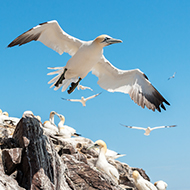Conservationists call for fresh approach to tackle avian flu

The Wildlife Trusts warns that entire UK populations of seabirds are at risk of being lost .
Conservationists are calling for a fresh approach to poultry farming to tackle avian influenza.
The Wildlife Trusts says that intensive units that house thousands of birds provide the “perfect conditions for new outbreaks” and mean that once a disease emerges, “it can sweep quickly through a large population and be difficult to contain.”
Their call comes amid an unprecedented outbreak of H5N1 avian flu, which has killed thousands of wild birds across the UK. It is believed to be the UK's worst ever outbreak of the disease, and has been particularly damaging for seabird colonies, such as gannets.
Joan Edwards, director of policy and public affairs at The Wildlife Trusts, said: “We need to see the Government take a new approach to producing food that farms in harmony with nature instead of harming it.
“Intensive poultry sheds are a source of disease, and the resulting chicken poo is polluting our rivers too. It’s also vital that we see stronger leadership on helping wild birds recover in a range of policy decisions this autumn.”
To help wild bird populations recover, the Trusts are calling on the Government to develop a national strategy to help wild bird populations recover and provide clearer guidance on wild bird carcass removal and disposal in high-risk areas.
The group would also like the Government to instil better monitoring, surveillance, research and reporting systems to build real-time understanding of the virus and its progress in wild birds.
Ms Edwards added: “Bird flu is killing huge numbers of wild birds that are already threatened by a range of other problems – from climate change and habitat loss, to overfishing and pollution.
"The Government has been slow to respond and the situation is far too serious to be swept under the carpet. Entire UK populations of seabirds are at risk of being lost.”



 Zoetis has launched a new survey to identify management techniques for Equine Herpes Virus (EHV).
Zoetis has launched a new survey to identify management techniques for Equine Herpes Virus (EHV).